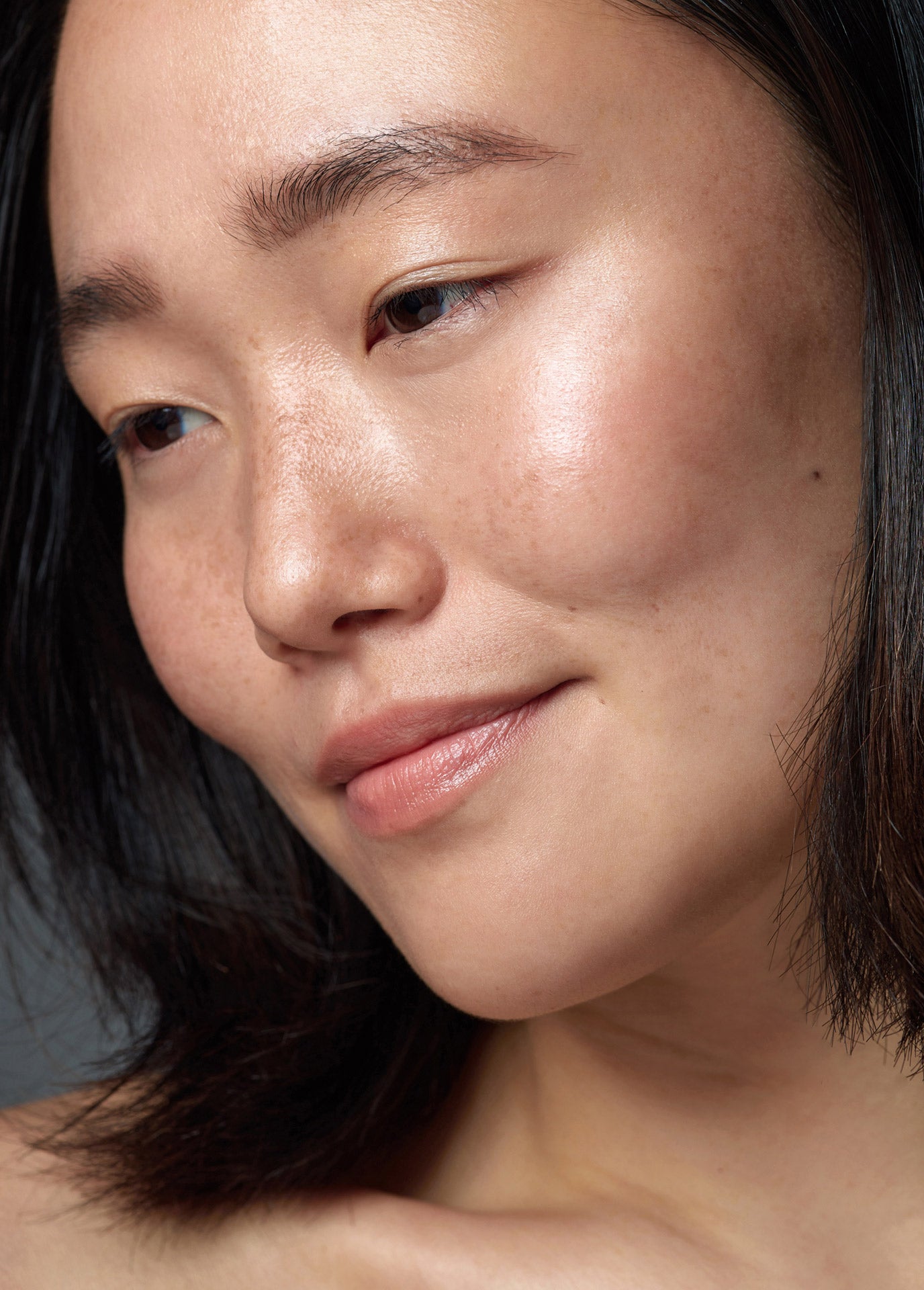Melanin-rich skin is beautiful, powerful and unique, yet it is fundamentally different from fairer skin tones. The presence of melanin causes the skin to react differently to dermatological conditions like acne, resulting in unique concerns that fair-skinned individuals don’t experience.
Post-inflammatory pigmentation (PIH) is among the most common of these concerns.
If you’re a woman of color, or have darker, melanated skin, you’ve likely noticed dark spots on your skin after an acne breakout, ingrown hair, or even a small scratch, which may cause you to wonder:
- Why does this happen to me?
- Are these dark spots permanent?
- How long does post-inflammatory hyperpigmentation last?
- What can I do to make it go away?
Well, first things first — there’s no need to panic. Post-inflammatory pigmentation is a normal skin reaction. In fact, 65% of African Americans, 52% of Hispanic Americans, and 47% of Asian Americans will experience it at least once in their lifetime.
With this being said, PIH is serious in terms of its potential to negatively impact a person’s self-image.
The good news? There are skin care treatments available that have been proven to effectively reduce the appearance of PIH.
Here’s what you need to know:
Post-Inflammatory Hyperpigmentation Treatment Explained
Generally speaking, there are two options for PIH treatment. These options are:
-
In-Office Treatments
This type of treatment for PIH involves seeing a professional esthetician, a dermatologist in a clinical setting and/or a medical aesthetics doctor who is able to assess, recommend and provide a specialized medical or cosmetic treatment, like laser resurfacing, microneedling, microdermabrasion, LED light therapy, or a irritating chemical peel.
-
At-Home Skincare Treatments
Unlike in-office treatments, at-home skin care remedies can be done conveniently in the comfort of your home using readily available products like cleansers, serums, and moisturizers. These PIH skin treatments are significantly more affordable than in-office alternatives and often provide comparable results.
While both treatment options have been shown to yield significant results, in-office treatments can be expensive and often aren’t realistic for the average consumer — especially since many procedures require multiple sessions to achieve the person’s desired outcome.
The best PIH treatment for you will depend upon various factors, like how much you’re willing to spend, whether or not you’re willing to undergo an invasive procedure, and how many solutions you’ve already tried.
It’s generally wise to start with at-home skin care treatments before moving on to in-office cosmetic or medical procedures. If your skin clears up, that’s great, and you’ll have saved money! If not, you’ll have peace of mind knowing other options are available.
Post-Inflammatory Pigmentation Causes:
It’s essential to closely examine the different causes of PIH before committing to a particular treatment, as addressing these underlying factors is essential to maximizing your results.
Below are the most common causes of PIH:
-
Acne Vulgaris
Acne vulgaris is a type of breakout involving multiple types of pimples (superficial and deep lesions) appearing on the skin simultaneously. Many underlying causes can lead to acne vulgaris, including excess sebum production, bacterial infections, stress, and hormonal imbalances.
When considering how to get rid of post-inflammatory pigmentation, it helps to know which (if any) of the conditions listed above might trigger your acne breakouts.
-
Eczema
Eczema may present differently on melanated skin than on paler skin tones. There’s less redness, and the skin may erupt with small bumps rather than the dry, leathery patches often seen on fair skin types.
These small eczema bumps can eventually result in PIH, so we always advise speaking with a physician or dermatologist to determine if eczema is causing unwanted dark spots.
If you are a woman of color or have a darker skin tone, and your skin feels warm, itchy, and dry — or if it has a darker brown, purple or patchy appearance — you may have undiagnosed eczema.
-
Skin Injuries
Scrapes, scratches, bug bites, and burns can all result in post-inflammatory pigmentation for darker skin tones with higher melanin. Just as the skin produces extra melanin when healing a pimple, it generates excess melanin when healing other types of injuries, leaving dark spots behind in the process.
If you were recently scratched by a pet, exposed to poison ivy, or burned after spending too much time in the sun — a skin injury could be the culprit when it comes to PIH.
Signs of Post-Inflammatory Pigmentation
We’ve briefly discussed what a post-inflammatory hyperpigmentation treatment is and the underlying causes that can result in this condition. But how do you know for sure you’re experiencing PIH?
You can look for several defining characteristics to determine if your dark spots are related to PIH. Let’s take a closer look at each one.
-
Flat Appearance
PIH does not cause papules, pustules, or bumps on the skin. Small patches of darker pigmentation will appear on the skin but will not be raised or distinguishable in terms of touch.
-
Identical Inflammatory Pattern
PIH results from underlying inflammation and therefore follows the original rash, acne breakout, injury, or infection pattern. It does not occur “out of the blue.” Your discoloration is likely PIH if it appears after a pimple, cut, or other skin condition has started to heal.
-
UV Light Responsive
In most cases, PIH's appearance will darken if exposed to prolonged periods of sunlight. Your dark spots may be more noticeable after an afternoon at the beach or if you live in an area where warm weather is the norm.
If you suspect you may have hyperpigmentation, we always advise speaking with a physician or dermatologist to receive an official diagnosis before investing in PIH skin treatments. Other dermatological conditions share similar symptoms as PIH, and an official diagnosis is the only way to determine the best course of action.
Post-Inflammatory Hyperpigmentation Treatments
It’s normal to wonder, “Is post-inflammatory hyperpigmentation permanent?” after receiving a diagnosis. We all aspire to have clear, healthy-looking skin, and the thought of permanent scarring can be distressing. Thankfully for darker skin tones, there are in fact several options regarding effective, specialized skin care products that treat PIH.
Here are a few of our top recommendations:
-
A Calming Cleanser
Dead skin cells, dust, and other airborne particles can become trapped in your pores and cause your skin to break out. For this reason, a soothing cleanser should always be part of any post-acne hyperpigmentation treatment. When a cleanser is formulated with gentle ingredients that reduce inflammation while simultaneously purifying your skin’s pores, it removes irritants and alleviates redness and swelling. This leaves your skin feeling cool and refreshed.
Our Calming Chamomile Cleanser is fortified with chamomile essential oil — a powerful organic ingredient that soothes even the most sensitive skin. It also reduces the appearance of scars and prevents future breakouts by acting as an antiseptic. For darker skin tones, it's an ideal fit -- delicate yet capable of delivering a deep, restorative rinse.
-
A Pore-Clearing Glycolic Gel
Sometimes, a traditional cleanser cannot provide the deep exfoliation required to remove stubborn dead skin cells or eliminate bacteria hiding far down in the folds and pores of your skin. Glycolic acid is a gentle chemical exfoliant with a low PH that dissolves oil, bacteria, and other forms of buildup, leaving behind a revitalized and breezy complexion.
For those wondering how to treat post-inflammatory hyperpigmentation, glycolic acid is a must-have ingredient. It has an unmatched ability to reduce the appearance of dark spots and the severity of acne breakouts.
Try our Clarifying Glycolic Gel for a truly transformative skin care regimen. It's gentle enough to wear as a daily (daytime) serum with an SPF, and it doesn't sting, burn, or cause itching.
-
A Hyperpigmentation-Minimizing Moisturizer
Your skin needs moisture to remain healthy and protected from future damage. Choosing a moisturizer with ingredients with strong antioxidants such as chromabright, vitamin C, or kojic acid is always a good idea as they all fade dark spots and contribute to a more even, radiant skin tone.
Our Ultra Glow Moisturizer is infused with chromabright and lipochroman, which not only have smoothing properties and provide an air-brushed texture-- these two antioxidants protect from UV and HEV rays, which promote skin from hyperpigmentation or discoloration.
Treat Post-Inflammatory Hyperpigmentation with Skincare Made by a Woman of Color for Women of Color
Our exceptional, easily-applied skin care products are specifically clinically-formulated for melanated, darker skin tones so that you can enhance your complexion without compromising your beautiful skin tone, and your confidence.
Our Founder, Dr. Simran Sethi, is committed to creating luxe yet sensible, nourishing, high-impact skin care products for people least represented in the skin care industry. As a woman of color, she understands how life-changing it is to access affordable, non-invasive skin care treatments thoughtfully tailored to darker skin tones. After all, women of color are more prone to specific skin conditions than their caucasian counterparts.
Dark Spots Don’t Stand a Chance Against Our Brightening Skin Care Products
Get ready for a radiant transformation! The antioxidant-packed formula in our skin brightening products helps reduce discoloration and dark spots, giving your complexion an instant boost of brightness and vitality. Its stabilized vitamins & peptides work to reveal healthier skin.
Shop the entire collection today.
Learn More
Still unsure how to best care for your melanated skin?
Read up on all the do’s and don’ts.
Want to invest in the best possible products?
Learn how to tell the difference between medical-grade skin care products and drugstore ones.
Curious about how melanated skin differs from fair skin?
Check out our blog on the science behind darker skin tones.
Read more

Does retinol dry out your skin? Retinol burn happens when you first start using retinol. If you use them properly, you're good. ✓ Read to find more answers!

How to repair the skin barrier? This guide gives a breakdown of what a damaged skin barrier is and how to fix it. ✓ Read on and protect your skin barrier.

